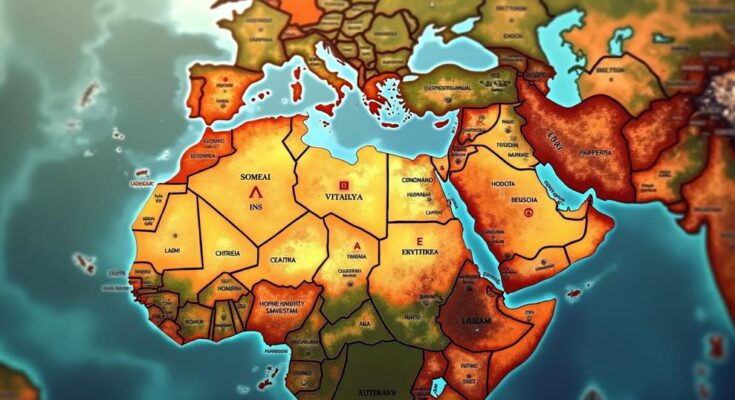Egypt is strengthening its position in the Horn of Africa through a newly formed tripartite alliance with Somalia and Eritrea, primarily aimed at countering Ethiopia. This alliance follows allegations of Egypt’s military involvement in the Sudan conflict, reflecting a strategic shift in its regional policy. The increasing tensions in the area have prompted responses from Ethiopia, with its Prime Minister vowing to deter any threat to national sovereignty.
Egypt is actively enhancing its strategic influence in the Horn of Africa by establishing alliances with Somalia and Eritrea. Recently, Egyptian President Abdel Fattah Al-Sisi attended a tripartite summit in Asmara alongside Eritrean President Isaias Afwerki and Somali President Hassan Sheikh Mohamud. This collaboration not only aims to expand their regional influence but also to form a united front against Ethiopia. The timing of this summit is notable, occurring shortly after allegations were made by Mohamed Hamdan Dagalo, commander of the Rapid Support Forces, accusing Cairo of conducting aerial assaults on his troops amid the turmoil in Sudan, which underscores Egypt’s military engagement in the conflict. By choosing to intervene directly, Egypt seeks to assert itself as a pivotal player in regional affairs, shifting away from its previous position during Sudan’s warfare. The summit was ostensibly designed to address regional security and fortify bilateral relations among the three nations, but narratives suggest it is intended to counter Ethiopia’s influence, particularly after Ethiopia secured a memorandum of understanding to enhance its presence in the Somaliland region, including access to a port and naval base along the southern Red Sea. In response to Egypt’s increasing assertiveness, Ethiopian Prime Minister Abiy Ahmed has expressed vehement opposition, asserting, “We will not allow them to harm us; we will humiliate anyone who dares to threaten us to deter them,” thus reflecting the rising tensions surrounding Egypt’s growing role in the area. Furthermore, while Egypt has professed its commitment to Sudan’s stability and has facilitated diplomatic efforts, it has simultaneously backed the army commander Abdel Fattah al-Burhan, indicating a complex duality in its approach to the conflict. Nevertheless, Egyptian officials maintain that their efforts are focused on bringing resolution to the ongoing instabilities in Sudan and that they are acting in a manner that aligns with the interests of Sudan’s sovereignty and security.
The Horn of Africa is a strategically significant region with increasing geopolitical tensions, particularly influenced by the roles of Egypt, Sudan, and Ethiopia. Egypt’s historical concerns regarding water security from the Nile River, compounded by Ethiopia’s Grand Ethiopian Renaissance Dam project, have spurred Cairo to seek alliances with nations such as Somalia and Eritrea. The recent conflicts in Sudan have further complicated the regional dynamic, with various factions vying for power and foreign interests complicating the situation. Egypt’s military involvement, while officially claimed to be non-existent, has attracted accusations and scrutiny, underscoring the delicate balance of alliances and enmities shaping the Horn of Africa’s geopolitical landscape.
Egypt’s strategic alliance with Somalia and Eritrea marks a significant shift in its regional policy, indicating a robust effort to counter Ethiopia’s influence amid rising tensions surrounding the Nile’s resources. As Egypt asserts itself militarily and politically, particularly in the context of the conflicts in Sudan, the regional security landscape is likely to face further challenges. The implications of this tripartite alliance could reverberate throughout the Horn of Africa, as it shapes the future geopolitical dynamics and power structures in the region.
Original Source: www.atalayar.com




